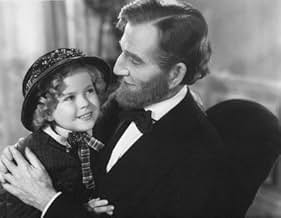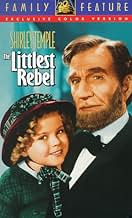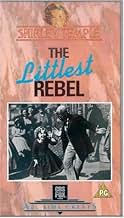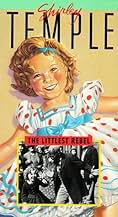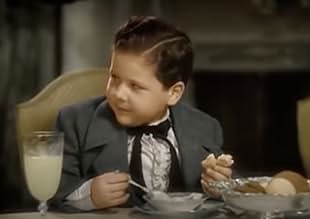IMDb-BEWERTUNG
6,7/10
1760
IHRE BEWERTUNG
Shirley Temples Vater, ein rebellischer Offizier, schleicht sich auf seine heruntergekommene Plantage zurück, um seine Familie zu sehen, und wird verhaftet.Shirley Temples Vater, ein rebellischer Offizier, schleicht sich auf seine heruntergekommene Plantage zurück, um seine Familie zu sehen, und wird verhaftet.Shirley Temples Vater, ein rebellischer Offizier, schleicht sich auf seine heruntergekommene Plantage zurück, um seine Familie zu sehen, und wird verhaftet.
- Regie
- Drehbuch
- Hauptbesetzung
- Auszeichnungen
- 4 wins total
Guinn 'Big Boy' Williams
- Sgt. Dudley
- (as Guinn Williams)
Empfohlene Bewertungen
Was there ever such a talented little kid as Shirley Temple? She could act, sing, dance and steal scenes with the best of them. Singlehandedly, she saved 20th Century Fox from bankruptcy during the 30's and made ordinary potboilers box office successes, such as "The Littlest Rebel". Submitting to such scene larceny here are John Boles, Jack Holt and Bill "Bojangles" Robinson, who gave her competition in several dance sequences.
This picture is set in Civil War South, and steps lightly through the minefield of the racism of slavery. Not sure if this picture could be made today, as racial tensions have been stewing since the Civil Rights Act of 1965, but this was 1935, and audiences had a better historical sense than is found nowadays. Just watch and enjoy the entertainment phenomenon that was Shirley Temple, Hollywood's all-time greatest scene-stealer.
6/10 - Website no longer prints my star ratings.
This picture is set in Civil War South, and steps lightly through the minefield of the racism of slavery. Not sure if this picture could be made today, as racial tensions have been stewing since the Civil Rights Act of 1965, but this was 1935, and audiences had a better historical sense than is found nowadays. Just watch and enjoy the entertainment phenomenon that was Shirley Temple, Hollywood's all-time greatest scene-stealer.
6/10 - Website no longer prints my star ratings.
I almost believe Shirley could end a war single-handed. Not the entire war, of course, but a few regiments from each side, camped across a creek from each other, going over their plans for tomorrow's battle... but wait! What's that noise? Why, it sounds like singing! And tap dancing! Then from out of nowhere, floating down the creek on a raft is little Shirley herself, singing 'Those Endearing Young Charms' in her prettiest dress, a pink bow in her hair. Hooray! shout the rebs, Hooray! shout the yanks! The generals from each side wade out to meet her and carry little Shirley off on their shoulders to the White House where an oddly blond-bearded Abe Lincoln asks her help in ending the war, reconstructing the south, appeasing the slaves, preventing his own assasination, working things out with Mary, and sobering up Grant. Accomplishing this in less time than it takes to curl her hair, our three-foot heroine bids a tearful farewell to America and sails to Germany, where she charms the baby Kaiser out of starting World War I.
THE LITTLEST REBEL (20th Century-Fox, 1935), directed by David Butler, another agreeable and rewarding motion picture featuring child star, Shirley Temple, teams her once again opposite 1935 co-stars John Boles (CURLY TOP) and Bill "Bojangles" Robinson (THE LITTLE COLONEL). Capitalizing on the success of THE LITTLE COLONEL, set after the Civil War, THE LITTLEST REBEL, taking place during the war between the states, finds Temple as a little girl winning the hearts of those around her, especially a tough Yankee soldier (Jack Holt) and U.S. President Abraham Lincoln (Frank McGlynn Sr.), with whom she shares his apple. An old chestnut by Edward Peple that was first staged and later filmed during the silent era in 1914, this edition, Temple's last for 1935, further demonstrates her as a fine child actress who equally handles her lighter and dramatic scenes with conviction and sincerity.
The story is set on a Southern plantation where Herbert Cary (John Boles) and his wife, Helen (Karen Morley) honor their child, Virginia, better known as Virgie (Shirley Temple), with a birthday party where she and her little guests are gathered together with ice cream and cake along with tap dancing entertainment by Cary's slave/ butler, Uncle Willie (Bill Robinson). Shortly afterwards, the party is disrupted by startling news that war has been declared between the states. Enlisting in the Army, Cary leaves his wife and child under the care of Uncle Willie. With Yankee scouts invading their property, Virgie, while playing soldier, sling shots Colonel Morrison (Jack Holt), addressing herself as a "confederate." In spite of their differences, Morrison, a father himself, takes an immediate liking to Virgie, later rescuing her from the threat of the villainous Sergeant Dudley (Guinn Williams) for not revealing the whereabouts of her "daddy." After the Cary estate is burned to the ground, causing Mrs. Carey to fall ill and die within three weeks time, Cary leaves his post to take Virgie over to Richmond where she's to be placed in the care of her Aunt Caroline. Complications arise when Carey is recognized and captured, separated from his daughter, imprisoned along with Morrison for helping him, each charged with treason and sentences to be executed.
With 20th-Fox specializing in Southern stories set during, before or after the Civil War, THE LITTLEST REBEL is a fine example capturing Southern hospitality and flavor with the reconstruction of plantations and notable songs from that era including "Swanee River" (by Stephen Foster) sung during opening credits; "Turkey in the Straw" (tap dance by Bill Robinson); "Those Endearing Young Charms" (sung by Shirley Temple); "Sometimes I Feel Like a Motherless Child" (by Thomas Moore and Matthew Locke); "Polly-Wolly Doodle" and "Polly-Wolly-Doodle" (sung by Temple and reprized during closing titles).
Of its cast members, Bill Robinson and Willie Best provide lighter moments to their traditional servant roles. Best's performance as a shiftless and comical slave gives the impression that his role as James Henry was actually intended for Stepin Fetchit. While Best doesn't imitate Fetchit's comical methods to the extreme, he works well alongside Robinson as his comic foil doing a brief takeoff in the popular "Amos and Andy" radio show tradition in the question and answer session where Best asks Robinson: "Why is a shoe called a shoe?" Although portraying their roles through stereotypes, Robinson comes through as an intelligent, caring and sensible slave with a talent for dancing. He's very convincing and sincere through his interacting with Temple, which is why they work so well together. John Boles satisfies as the easy-going father turned soldier and accused spy while Karen Morley, despite of her screen limitations, makes due with her role.
Due to controversy in how the black performers are portrayed, cable television revivals of THE LITTLEST REBEL in recent years have been limited, though shown frequently at some point on American Movie Classics (1996-1999), the Fox Movie Channel, and availability since the 1980s on home video and afterwards DVD either in black and white or colorized formats. In May 2006, THE LITTLEST REBEL was one of the films chosen as part of its subject matter of "Black Images on Film" theme co-hosted by author Donald Bogle, where he and host Bob Osborne discussed the film, performances of Robinson and Best, as well as a scene where Temple gets herself corked up to avoid Yankee soldiers.
THE LITTLEST REBEL, along with THE LITTLE COLONEL, were intended as screen entertainment with no intention to offend, yet something to consider as a reflection of the times, and how a Civil War story such as this is seen through the eyes of Virgie Carey, the littlest rebel. (***)
The story is set on a Southern plantation where Herbert Cary (John Boles) and his wife, Helen (Karen Morley) honor their child, Virginia, better known as Virgie (Shirley Temple), with a birthday party where she and her little guests are gathered together with ice cream and cake along with tap dancing entertainment by Cary's slave/ butler, Uncle Willie (Bill Robinson). Shortly afterwards, the party is disrupted by startling news that war has been declared between the states. Enlisting in the Army, Cary leaves his wife and child under the care of Uncle Willie. With Yankee scouts invading their property, Virgie, while playing soldier, sling shots Colonel Morrison (Jack Holt), addressing herself as a "confederate." In spite of their differences, Morrison, a father himself, takes an immediate liking to Virgie, later rescuing her from the threat of the villainous Sergeant Dudley (Guinn Williams) for not revealing the whereabouts of her "daddy." After the Cary estate is burned to the ground, causing Mrs. Carey to fall ill and die within three weeks time, Cary leaves his post to take Virgie over to Richmond where she's to be placed in the care of her Aunt Caroline. Complications arise when Carey is recognized and captured, separated from his daughter, imprisoned along with Morrison for helping him, each charged with treason and sentences to be executed.
With 20th-Fox specializing in Southern stories set during, before or after the Civil War, THE LITTLEST REBEL is a fine example capturing Southern hospitality and flavor with the reconstruction of plantations and notable songs from that era including "Swanee River" (by Stephen Foster) sung during opening credits; "Turkey in the Straw" (tap dance by Bill Robinson); "Those Endearing Young Charms" (sung by Shirley Temple); "Sometimes I Feel Like a Motherless Child" (by Thomas Moore and Matthew Locke); "Polly-Wolly Doodle" and "Polly-Wolly-Doodle" (sung by Temple and reprized during closing titles).
Of its cast members, Bill Robinson and Willie Best provide lighter moments to their traditional servant roles. Best's performance as a shiftless and comical slave gives the impression that his role as James Henry was actually intended for Stepin Fetchit. While Best doesn't imitate Fetchit's comical methods to the extreme, he works well alongside Robinson as his comic foil doing a brief takeoff in the popular "Amos and Andy" radio show tradition in the question and answer session where Best asks Robinson: "Why is a shoe called a shoe?" Although portraying their roles through stereotypes, Robinson comes through as an intelligent, caring and sensible slave with a talent for dancing. He's very convincing and sincere through his interacting with Temple, which is why they work so well together. John Boles satisfies as the easy-going father turned soldier and accused spy while Karen Morley, despite of her screen limitations, makes due with her role.
Due to controversy in how the black performers are portrayed, cable television revivals of THE LITTLEST REBEL in recent years have been limited, though shown frequently at some point on American Movie Classics (1996-1999), the Fox Movie Channel, and availability since the 1980s on home video and afterwards DVD either in black and white or colorized formats. In May 2006, THE LITTLEST REBEL was one of the films chosen as part of its subject matter of "Black Images on Film" theme co-hosted by author Donald Bogle, where he and host Bob Osborne discussed the film, performances of Robinson and Best, as well as a scene where Temple gets herself corked up to avoid Yankee soldiers.
THE LITTLEST REBEL, along with THE LITTLE COLONEL, were intended as screen entertainment with no intention to offend, yet something to consider as a reflection of the times, and how a Civil War story such as this is seen through the eyes of Virgie Carey, the littlest rebel. (***)
This was the first Shirley Temple movie I ever watched (on VSH....hey, I'm not THAT old) and I still consider it one of her best.
That's because it has a great mixture of drama, comedy, song/dance and suspense. Almost all the characters are likable. The two dances scenes with Temple and Bill Robinson are excellent....a joy to watch. I don't know if Shirley ever looked cuter than in this film. She runs the gamut of emotions in here quite frequently.
The 74-minute story never has a lull. John Boles and Karen Moreley are people you root for, Willie Best provides good comedy and there is a surprising amount of suspense.
Overall, however, this is simply a sweet, sentimental film that leaves you feeling good after watching it.....and what's wrong with that?
That's because it has a great mixture of drama, comedy, song/dance and suspense. Almost all the characters are likable. The two dances scenes with Temple and Bill Robinson are excellent....a joy to watch. I don't know if Shirley ever looked cuter than in this film. She runs the gamut of emotions in here quite frequently.
The 74-minute story never has a lull. John Boles and Karen Moreley are people you root for, Willie Best provides good comedy and there is a surprising amount of suspense.
Overall, however, this is simply a sweet, sentimental film that leaves you feeling good after watching it.....and what's wrong with that?
The thing which is racist about the film is not that it sets out to show anything evil about the black people - Shirley seems to be quite fond of her slaves, unless of course they do something wrong - but in the subtle way it suggests there was nothing wrong with the situation the Deep South was in before the civil war.
The black people are not only less intelligent than the whites (notice the girl so dumb she can't even remember a single line her mother told her to memorise to impress the young white child star - or perhaps she's just so nervous in the presence of the superior species that she can't remember), but they're completely happy being enslaved.
They absolutely love being told what to do by the six year old landowner's daughter, and the neighbourhood slaves just wait around for young Shirley to lavish some attention on them.
The thing I most regret about the film was that they forced the blacks to dance and entertain their white hosts like a bunch of chained elephants or circus freaks.
Its always a bad sign when the civil war is portrayed as a distruption to the desired state of affairs, as it is here and in Gone with the Wind.
1/5
Only youngsters, who don't yet understand that the only difference between white folks and black folks is skin pigment, which only evolved from a group of people living in an ultra-sunny climate for years, will be able to enjoy this film. But perhaps its better for society if you don't show it to them - the young are so impressionable, after all.
UPDATE: Can I point out that I've noticed people don't like this review, and I'm not surprised; its intentions were so innocent, it feels a shame to accuse it of causing offense, but unfortunately, I'd still suggest this one not be shown to impressionable kids for the reasons I have outlined above.
The black people are not only less intelligent than the whites (notice the girl so dumb she can't even remember a single line her mother told her to memorise to impress the young white child star - or perhaps she's just so nervous in the presence of the superior species that she can't remember), but they're completely happy being enslaved.
They absolutely love being told what to do by the six year old landowner's daughter, and the neighbourhood slaves just wait around for young Shirley to lavish some attention on them.
The thing I most regret about the film was that they forced the blacks to dance and entertain their white hosts like a bunch of chained elephants or circus freaks.
Its always a bad sign when the civil war is portrayed as a distruption to the desired state of affairs, as it is here and in Gone with the Wind.
1/5
Only youngsters, who don't yet understand that the only difference between white folks and black folks is skin pigment, which only evolved from a group of people living in an ultra-sunny climate for years, will be able to enjoy this film. But perhaps its better for society if you don't show it to them - the young are so impressionable, after all.
UPDATE: Can I point out that I've noticed people don't like this review, and I'm not surprised; its intentions were so innocent, it feels a shame to accuse it of causing offense, but unfortunately, I'd still suggest this one not be shown to impressionable kids for the reasons I have outlined above.
Wusstest du schon
- WissenswertesBoth John Boles and Bill Robinson nearly drowned while trying to cross a raging, 15-foot river for an escape scene that was cut from the film.
- PatzerWhen the Union soldiers are caught looting, the commanding officer orders them to be flogged. The US Army according to the "History of the United States Army" stopped flogging at the beginning of the Civil War in 1861--this scene is obviously later in the war as Union forces are occupying the south.
- Zitate
Virginia 'Virgie' Cary: [singing] Oh, I eat watermelon and I have for years. Sing Polly-Wolly-Doodle all the day! I like watermelon but it wets my ears. Sing Polly-Wolly-Doodle all the day!
- Alternative VersionenAlso available in a computer colorized version.
- VerbindungenFeatured in Of Black America: Black History: Lost, Stolen or Strayed (1968)
- SoundtracksPolly Wolly Doodle
(1880) (uncredited)
Traditional
Modified Music by Sidney Clare (1935)
Modified Lyrics by Buddy G. DeSylva (1935)
Sung by Shirley Temple with Bill Robinson
Reprised at the end by Shirley Temple
Top-Auswahl
Melde dich zum Bewerten an und greife auf die Watchlist für personalisierte Empfehlungen zu.
- How long is The Littlest Rebel?Powered by Alexa
Details
- Erscheinungsdatum
- Herkunftsland
- Sprache
- Auch bekannt als
- The Littlest Rebel
- Drehorte
- Produktionsfirma
- Weitere beteiligte Unternehmen bei IMDbPro anzeigen
- Laufzeit1 Stunde 13 Minuten
- Farbe
- Seitenverhältnis
- 1.37 : 1
Zu dieser Seite beitragen
Bearbeitung vorschlagen oder fehlenden Inhalt hinzufügen



